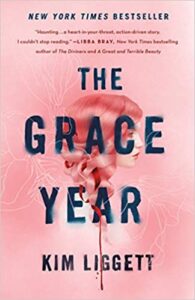A note from the editor:
We are getting near the end of November and Monster Librarian still needs to raise the funds to pay for our hosting fees and postage in 2021. If you like what we’re doing, please take a moment to click on that red “Contribute” button in the sidebar to the right, to help us keep going! Even five dollars will get us closer to the $45 we still need to keep going at the most basic level. We have never accepted paid advertising so you can be guaranteed that our reviews are objective. We’ve been reviewing and supporting the horror community for 15 years now, help us make it another year! Thank you! And now our review of The Grace Year by Kim Liggett.
The Grace Year by Kim Liggett ( Bookshop.org | Amazon.com )
Wednesday Books, 2019
ISBN-13 : 978-1250145444
Available: Hardcover, Kindle edition, audiobook
At first glance, The Grace Year seems like a YA take on The Handmaid’s Tale crossed with The Lord of the Flies. It takes place in an alternate society where women and girls are divided into groups by the colors of their hair ribbons: white for girls, black for wives, and red for grace year girls. Grace year girls are sent to an isolated camp as a group when they turn sixteen, after boys and men their age and older have an opportunity to choose one to marry from among them. Some girls are “veiled” and the rest know they will be assigned to manual labor tasks. The younger sisters of the girls who don’t return run the risk of being sent to the outskirts, where they will struggle to survive and are expected eventually to sexually service men no longer satisfied with their wives.
Protagonist Tierney is about to begin her grace year. She does not aspire to be veiled, but would rather labor outside when her grace year is done, as wives’ movements and speech are very restricted and she has always enjoyed spending time outdoors, learning useful skills from her father and spending her time alone and with her friend Michael, whose family is very high status. Rather than choosing Kiersten, the girl his family has picked out for him, though, Michael chooses Tierney to keep her safe, not realizing that he has actually made her a target during the grace year.
The supposed purpose of the grace year is for girls to come into their magic and work it out of themselves without risking the men, so the girls are “safe” to be around, but girls know that things too terrible to talk about must happen, because of each group of girls that leaves, fewer come back, and the ones who do are traumatized and refuse to speak about it. In addition to their isolation, the girls must stay within a fence, because they are being hunted by “poachers” who will skin them alive, dissect them, bottle the parts, and sell them back to the men in town as aphrodisiacs. There is the obligatory section of a YA speculative survival novel where a character whose job it is to exterminate a girl actually saves her and heals her and they fall in love, but it is particularly gruesome because there is no hiding the fact that he’s there to skin, dissect, and bottle her for consumption– he even has diagrams. The body horror is strong in this book, although most of the actual damage is done offscreen.
It is difficult to write about the characters and society in this book, both women and men, because from best to worst every one of them is so poisoned by patriarchy. The gaslighting of women and girls is so extensive and ingrained that it can’t really be separated out. Would Kiersten be so cruel if she hadn’t been trapped by society’s constraints since she was a child? Would so many of the girls have been so eager to believe in their magic if they hadn’t been powerless their entire lives? Even “good” men like Michael, with the best of intentions, can’t undo the damage. In 800+ pages (Amazon says there are 416, my Kindle says 815) there was not a single character in this book whose decisions could be trusted, including Tierney’s. The ending was absolutely crushing to me. I have to hope that YA readers who get all the way through to the end will develop a strong desire to examine their decisions and choices in light of the damage patriarchy does to all of them in the present, rather than waiting for the next generation. Whether they do or not, given the number of comparisons to The Hunger Games, I am sure many will find it a compelling read. Recommended.






Follow Us!